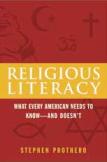Take the Test
Stephen Prothero, a historian of American religion and the author of a much acclaimed earlier volume, American Jesus, takes his cue for his title from E. D. Hirsch’s 1987 volume Cultural Literacy: What Every American Needs to Know. Prothero addresses a huge paradox: America is very religious but, as George Gallup once noted, is simultaneously a nation of religious illiterates. Most Americans cannot name one of the authors of the four Gospels, let alone enumerate the five pillars of Islam or the four truths of Buddhism.
Religion matters greatly in our world, but current American education is profoundly illiberal in its refusal to take religion seriously. Some young Americans are no longer learning the Bible well in their homes or congregations. American young people are apt to guess Joan of Arc was Noah’s wife (they shared that ark!). In public schools religion serves as a kind of third rail such that, as Martin Marty once famously observed: “Instead of teaching about religion, they teach around it.”
Any good historian knows that religion played a key role in United States history, yet, Prothero claims, it continues to get short shrift in history texts. Only 640 of the 15,000 public high schools surveyed offer any course in religious studies. The University of North Carolina sociologist Christian Smith, in his important study Soul Searching: The Religious and Spiritual Lives of American Teenagers (Oxford Univ. Press, 2005), has amply documented the general and dismal failure of most home and congregation-based religious teaching in providing American teens with a coherent literacy about their religious heritage.
Prothero would like to see religion in the schools become a fourth R rather than a third rail. His purpose in this essay is to produce citizens who know enough about Christianity and the world’s religions to participate meaningfully in religiously inflected public debates (whether about abortion, capital punishment, stem cell research, human sexuality, marriage or wars). His perhaps overly sanguine hope is that studying about religion might make the world both more interesting and less dangerous.
Americans were not always so religiously illiterate. In the 19th century, six important venues inculcated Bible knowledge: home, church, school, Sunday schools, bible societies and colleges. Early American textbooks (The New England Primer, Noah Webster’s Speller, McGuffey readers) were awash in biblical allusions. No one thinks we can or should return to “the sacred public school.” The courts have ruled that schools must be religiously neutral (as to any specific religion, or to preferring religion over irreligion or vice versa). In place of the sacred public school, Prothero argues, we now have a naked public school. He proposes, in its stead, a civic public school where religion is taught as a key subject (not catechism but religious studies) for citizenship competency. A number of Supreme Court decisions have clarified that teaching about religion is eminently constitutional.
In a deft historical excursus, Prothero shows how during the 19th and 20th centuries religion in America morphed from intellect to feeling; from doctrine to story telling; from the Bible as such to Jesus; from theology to morality. The great revivals tended, in place of the classic fides quaerens intellectum, to inculcate a kind of faith without understanding, rooted in heart religion alone. The precise error, however, in the earlier attempt to have a “sacred public school” was the fictitious notion that there is some common faith. But religion can never be made generic. Even the much vaunted term Judeo-Christian heritage is a kind of social construction of reality. Now some are proposing a new formulation, Abrahamic faiths: Christian, Jewish and Muslim. Religious particularities do not so easily meld into a common “faith.”
No one supposes that a careful teaching about religion in the public schools is easy. Yet being silent about something so salient in human life also is a kind of pedagogy. As Prothero puts it: “You cannot avoid teaching your kids about religion. If you offer them nothing, you are telling them that religion counts for nothing.” The author would attach three caveats to his proposal to teach two courses in public schools, one on Bible knowledge—to understand the Christian roots of American culture—and one on world religions. First, such courses should be taught only if there are trained teachers, truly capable of providing an “objective” and fair presentation of religious ideas. Second, parents should be allowed an opt-out strategy from such courses. Finally, such courses must avoid suggesting “all religions are equal” or that only a kind of cultural relativism can encompass the study of world religions.
In the second part of the book, Prothero provides a lengthy dictionary of religious literacy, adapted to fit and make references to some contemporary religious influences in American or world culture (e.g., references to religion in pop songs or in the news about the Middle East). The great merit of this book and its appended dictionary is that it calls attention to an acute problem in American culture and education. Awash in a sea of faith, we barely know or have an inkling of what drives the various faiths in our midst. Democracy has always opposed illiteracy, because only an informed citizenry yields sound policies. Illiterate religion is dangerous religion!
This article also appeared in print, under the headline “Take the Test,” in the April 30, 2007, issue.








